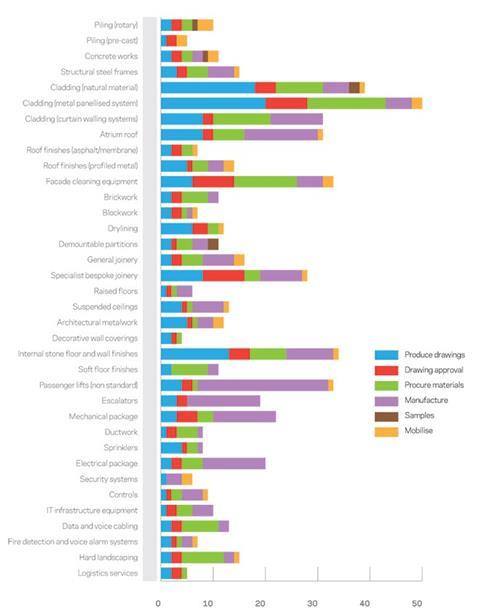Lead times have changed for only two packages - the lowest level of change recorded in the last decade. But many packages are reporting difficulty in getting qualified or experienced staff, reports Brian Moone of Mace
01 / Going up
▲ Structural steel frames
02 / Staying Level
▶ Rotary piling
▶ Pre-cast piling
▶ Cladding (natural materials)
▶ Cladding (metal panellised system)
▶ Cladding (curtain walling system)
▶ Atrium roof
▶ Roof finishes (asphalt / membrane)
▶ Roof finishes (profiled metal)
▶ Facade cleaning equipment
▶ Brickwork
▶ Blockwork
▶ Drylining
▶ Demountable partitions
▶ General joinery
▶ Specialist joinery
▶ Raised floors
▶ Suspended ceilings
▶ Architectural metalwork
▶ Decorative wall coverings
▶ Internal stone floor and wall finishes
▶ Soft floor finish
▶ Passenger lift (non standard)
▶ Esclator
▶ Electrical package
▶ Mechanical package
▶ Ductwork
▶ Sprinklers
▶ Security systems
▶ Controls
▶ IT infrastructure equipment
▶ Data and voice cabling
▶ Hard landscaping
▶ Logistics services
03 / Going Down
▼ Fire detection and voice alarm systems
04 / Lead times summary
Rotary piling ▶ firms report no change in lead times for this quarter and lead times remain at 10 weeks. Demand in the next six months is stable but contractors are reporting a shortage of labour. Pre-cast piling ▶ lead times remain at five weeks, following four weeks reduction over the past year.
Concrete works ▶ lead times stabilised at 11 weeks, having increased by one week last quarter. Contractors do not anticipate increases over the next six months.
Structural steel frames ▲ lead times have increased by one week to 15 weeks. Contractors are not anticipating change in the next six months.
Cladding (natural) ▶ material lead times remain at 39 with no change in the last year. Cladding (metal panellised system) ▶ Lead times remain at 50 weeks with workload and enquiries remaining stable and no increases anticipated. Cladding (curtain walling system) ▶ lead times remain at 31 weeks. Contractors do not anticipate increases over the next six months.
Atrium roof ▶ lead times remain at 31 weeks.
Roof finishes (asphalt / membrane) ▶ lead times remain at seven weeks. Contractors do not anticipate lead times increasing in the next six months. Roof Finish (profiled metal) ▶ lead times have remained at 14 weeks for more than a year. No increase in lead times are anticipated in the next six months.
Facade cleaning equipment ▶ lead times remain at 33 weeks. Contractors are busier compared with six months ago, but anticipate being able to absorb this. Lead times will remain the same over the next six months.
Brickwork ▶ lead times remain at 11 weeks. No changes anticipated over the next six months.
Blockwork ▶ lead times remain at seven weeks. Firms do not expect lead times to increase over the next six months despite increased workload and enquiries.
Drylining ▶ lead times remain at 12 weeks. Contractors are absorbing ongoing increases in workload, with no increases anticipated in the next six months.
Demountable partitions ▶ lead times remain at 11 weeks. No change anticipated over the next six months.
General joinery ▶ lead times remains at 16 weeks. No further increases are anticipated in the next six months.
Specialist joinery ▶ no change this quarter with lead times remaining at 28 weeks following the increase of three weeks last quarter. Further increases anticipated.
Raised floors ▶ lead times remain at six weeks with no changes reported. Suspended ceiling ▶ lead times remain at 13 weeks with no increase forecast for the next six months.
Architectural metalwork ▶ lead times remain at 12 weeks. No further increases reported.
Decorative wall covering ▶ lead times remain at four weeks. No change anticipated in the next six months.
Internal stone floor and wall finish ▶ lead times remain at 34 weeks following an increase of one week nine months ago. No increases are anticipated in the next six months. Soft floor finish ▶ lead times remain at 11 weeks following increases a year ago. No further increases anticipated in the next six months.
Passenger lift (non standard) ▶ lead times remain at 33 weeks. Workload and enquiries remain the same with no further change forecast for the next six months despite an increase in the level of work and enquiries.
Escalator ▶ lead times remain at 19 weeks with no change reported for the next six months.
Electrical package ▶ lead times remain at 20 weeks following last quarter increase of three weeks. Lead times are not forecast to increase in the next six months.
Mechanical packages ▶ lead times remain at 22 week this quarter. Contractors report that workload and enquiries have stabilised. No further increases are anticipated in the next six months.
Ductwork ▶ lead times remain at eight weeks with no change forecast for the next six months.
Sprinklers ▶ lead times remain at eight weeks. Contractors do not forecast an increase in lead times over the next six months.
Security systems ▶ lead times remain at six weeks with no changes reported for the next six months.
Controls ▶ lead times remain at nine weeks. Enquiries and workload has stabilised with no changes in lead times anticipated in the next six months.
IT infrastructure equipment ▶ remain at 10 weeks.
Data and voice cabling ▶ remain at 13 weeks.
Fire detection and voice alarm systems ▼ lead times have reduced by a further two weeks to seven weeks. Contractors still experience lower levels of enquiries.
Hard landscaping ▶ lead times remain at 15 weeks. Workload and enquiries are busier than six months ago. However, no change to lead times are anticipated in the next six months.
Logistics services ▶ lead time remains at five weeks. Despite being busier with enquiries and workload, there is no change forecast in the next six months.

Data capture and analysis by Mace Business School.

























No comments yet